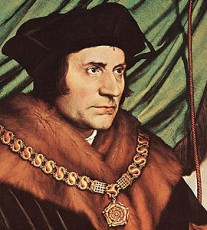Catholic Blesseds, Saints, Solemnities & Holy Days

Saint Thomas More
Feast Day: June 22
Patronage: Lawyers
St. Thomas More is a saint that is widely recognized in the church today, especially here in the United States. St. Thomas More was born in London in 1478. He had a thorough education in both religion and the classics, and then entered Oxford to study law.
After leaving Oxford University he began a legal career, which took him to Parliament. In 1505 he married and had four children with his wife, but she passed away at a young age. He then married a widow, who became a good mother for his young children.
This well educated man also known as a reformer, had a circle of Bishops and Scholars as his friends. In 1516, he wrote his world famous book “Utopia”. This attracted the attention of Henry VIII who appointed him to a succession of high posts and missions, and finally made him Lord Chacellor in 1529. However, when Henry VIII persisted in holding his own opinions regarding marriage and the supremacy of the Pope, Thomas resigned.
St. Thomas More spent the rest of his life writing, mostly in defense of the Church. In 1534 with his close friend St. John Fisher, he refused to render allegiance to the King as the Head of the Church of England and was confined to the Tower. Fifteen months later, and just nine days after St. John Fisher’s execution, he was tried and convicted of treason. He told the court that he could not go against his conscience and wished his judges that “we may yet hereafter in heaven merrily all meet together to everlasting salvation”. On the scaffold he told the crowd of spectators that he was dying as “the King’s good servant, but God first”. He was beheaded on July 6, 1535.
Practical Take Away
St. Thomas More spent his life studying, learning, and writing about the faith so that his life and work may be an example to all those after him. He shows us that we can be in the world, and in our governments, but that we must always keep our eyes fixed on God first. His resilient desire to serve God “first”, and the King “second”, cost him his life. But even at death’s door, he wished his judges that they would all be united in Heaven, in “Everlasting Salvation”. What a heroic virtue of forgiveness of his acusers – and something that we can draw strength from. When we are faced with making a decision to follow the world or God – let us draw from St. Thomas More, and always choose God first.





